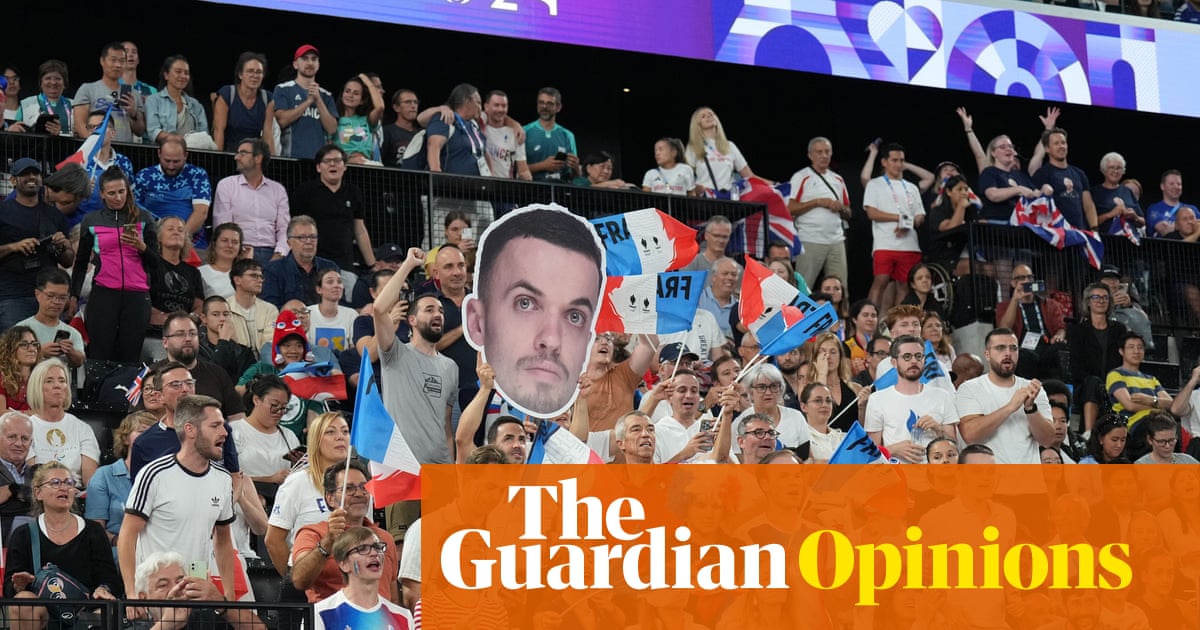Ahead of these Games, one of the things we were all worried about was whether they’d have the crowds. Whether Paris could deliver that same energy and enthusiasm we remember from London. I think we now know the answer. On Monday I was at the para-badminton semi-final between Krysten Coombs and Charles Noakes, and it was like: wow. There were 7,000 people there, they were raising the roof, they were singing the Marseillaise, they were on their feet waving flags when their guy came in, they had giant pictures of his head.
I have to say, I really felt sorry for Coombs. He came into this cauldron of noise where all the warmth was for the French athlete and I could see he was thinking: ‘How do I manage the crowd?’ That’s something we’re not taught as Paralympians. Often our sports are just not played in front of big crowds. The Paralympics is only every four years and even then, in the past, when you played in front of crowds they just cheered for everyone. Now you go to places and they don’t care if a guy’s a Paralympian or disabled, if he’s not from their country, if he’s not on their team, that guy’s getting booed.
Krysten went out aggressive, he went for every shot, diving and scrambling all over the floor and you could sense that was the only way he felt he could deal with it. But then there came a moment when he won a point and he turned to the crowd gesticulating as if to say, “come on, give me more” and the crowd, well, there was suddenly this tidal wave of boos. He looked shellshocked. And the irony of the whole thing is that his opponent was born in Sidcup!
I just wanted to go out there and give our guy a hug. But that’s the beauty of sport, I guess. I think Coombs had a realisation: ‘Not only have I got to beat my opponent, I’ve also got to beat this crowd.’ And it’s virtually impossible unless someone plays the picture perfect game. You’ve got to have absolute belief in your ability and iron will and focus to be able to drown out all the noise and believe. That’s another level of mentality, and that’s where Paralympians probably need to get to now; you will see next level athletes as a result.
So well done to the French. In terms of crowds and atmosphere at these Paralympic Games, I definitely think they have delivered. They have really embraced it and a round of applause for what they’ve done. But I also think I understand what Jonnie Peacock was getting at when he said, after his race on Monday night, that coming up to Paris “we’ve let the Paralympics die”.
What I believe he’s alluding to is that the Paralympics is the shop window. This is the crème de la crème, if you want to have a French analogy. But this showcase doesn’t mean anything unless we bring the sport along in the intervening years. Para-sport needs to be seen by people all the time. It needs to be shown on TV alongside non-disabled sport. So when you’re showing the Premier League, show blind football. When you’re showing NBA basketball, show the wheelchair basketball. When you’re showing the swimming and the athletics, there should be para-sport races too. It has to be on all the time. It’s an impossible mission otherwise, we are delaying the progress of the sport if we expect the Paralympics to carry it and to carry people on for another four years.
Fair play to Jonnie calling out Seb Coe and calling out the Diamond League and the IAAF. They have to show some leadership and start putting on the events, but the media has to be in conjunction with them and the governing bodies too; people in the IPC and ParalympicsGB. It needs people in those organisations who understand the nature of TV and entertainment and who are willing to work with them, because some of our events are raw, the depth isn’t there yet, and we need people who are willing to make the tweaks to make the sport entertaining.
Many of the sports are already ready for prime time, but we’re at this disadvantage because not enough people know about our sport, not enough people know about our athletes, and we have to work a little bit harder. But I believe that if we do that we’re going to create a product that will be far superior to every non-disabled product out there because we’ve got a lot more to offer.
after newsletter promotion
Just look at some of the events at the athletics this summer. The high jump for me has been a standout. I sit here as a Paralympian watching it and I think: “How could someone with one leg, just hop along and literally jump over something the height of a door frame? How does someone with a prosthetic leg, someone like the new American star Ezra Frech, go and do these incredible jumps?” It’s jaw-dropping.
It’s like that saying: a dog is for life, not just for Christmas. Disability sport is for life, not just for the Paralympics. That’s where we should be, that’s the mentality, and we should be looking at ourselves and saying; we’ve got a great product, but how can we make it even more entertaining?
